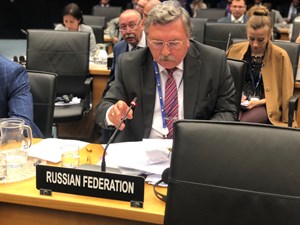Russian diplomat walks back comments on Iran nuclear deal breakthrough
(Bloomberg) --A senior Russian diplomat denied reports that he expects an imminent breakthrough in critical negotiations over restoring the Iranian nuclear deal, after tweets suggesting such an advance triggered a slump in oil prices.
Mikhail Ulyanov, Russia’s representative at the United Nations’ International Atomic Energy Agency, said that while significant progress had been made by officials seeking to orchestrate a U.S. return to the pact abandoned by then-President Donald Trump, “unresolved issues still remain.”
“The negotiators need more time and efforts to finalize an agreement on restoration” of the deal, Ulyanov added on Twitter. Earlier, the BBC had in tweets quoted him as saying that an “important announcement” would probably be made on Wednesday, when the joint commission of deal signatories will meet for their next round of talks in Vienna.
Three European officials, who declined to be named because of the sensitivity of the matter, said they weren’t aware of any major announcements soon.
I didn’t say there was a breakthrough at the Vienna talks on #JCPOA. I said that significant progress have been achieved, in my view. That is true. But unresolved issues still remain and the negotiators need more time and efforts to finalise an agreement on restoration of JCPOA. https://t.co/ZLCAxrTXCQ
— Mikhail Ulyanov (@Amb_Ulyanov) May 18, 2021
Oil initially extended losses on the BBC report to fall as much as 3.1% in London, before regaining some ground as Ulyanov rebutted the claims. A return to the 2015 deal is likely to mean that the U.S. will reinstate sanctions waivers for purchases of Iranian crude, raising the prospect of more supply coming to the market.
For the past six weeks, Iran and the U.S. have been engaged in indirect talks in the Austrian capital. World powers -- including the European Union, Russia and China -- have to achieve two aims: a deal that lifts U.S. sanctions on Iran, and brings Iran back into compliance with limits set on its atomic program by the 2015 accord.
In response to Trump’s penalties, Tehran substantially expanded its enrichment activities, nearing the level of uranium purity needed for a nuclear warhead.
More immediately, diplomats face a May 22 deadline on an interim inspections agreement between Iran and the IAEA. The Islamic Republic’s lead negotiator in Vienna, Abbas Araghchi, has said his country would consider extending that deal, if needed.
Iran’s President Hassan Rouhani -- who championed the original agreement and is several months away from leaving office -- is under pressure from a hardline parliament that’s hostile to the nuclear deal. Conservative lawmakers are demanding Iran continue expanding its nuclear work while the U.S. is out of the accord.



